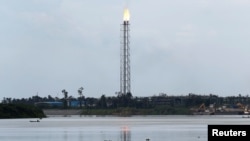Nigerian President Muhammadu Buhari on Thursday urged community leaders from the Niger Delta to pacify people in the restive southern region, which has been hit by a series of attacks on oil and gas facilities in the last few months.
Nigeria, an OPEC member which was until recently Africa's biggest oil producer, relies on crude sales for around 70 percent of national income. Most of its oil comes from the impoverished swampland Delta region.
Militants, whose attacks pushed oil production to 30-year lows in recent weeks, have called for a greater share of the country's oil wealth to be passed on to the region's communities and for authorities to clean up areas blighted by oil spills.
"When you get together with other leaders, please pacify the people," Buhari told a delegation of community leaders at his residence in the capital, Abuja, adding that he wanted "as much intelligence as possible on the situation in the Niger Delta."
"We intend to rebuild this country," said Buhari. "A lot of damage has been done, so I want you to tell the people to be patient."
Comments made to the group during the meeting, which lasted around an hour, were detailed in an emailed statement issued by the presidency titled "We'll rebuild the Niger Delta."
Earlier this month it was announced that the government's military campaign in the Delta would be scaled down, after having been built up a few weeks earlier, to pursue talks with militants.
Last week petroleum ministry sources said a month-long truce had been agreed with militants but the Niger Delta Avengers, who have claimed responsibility for most attacks, later said they did not "remember" agreeing to a ceasefire. However, the Avengers have not carried out an attack since June 16.
Following Thursday's meeting, Buhari's spokesman Femi Adesina said an amnesty agreed in 2009 to end a previous insurgency was "being studied with a view to determining what had been fulfilled."
If there were any outstanding issues, these would be addressed, he said.
The president angered former militants earlier this year when he cut the budget assigned to the amnesty program, which offered militants cash and job training in exchange for stopping attacks, by two-thirds.





